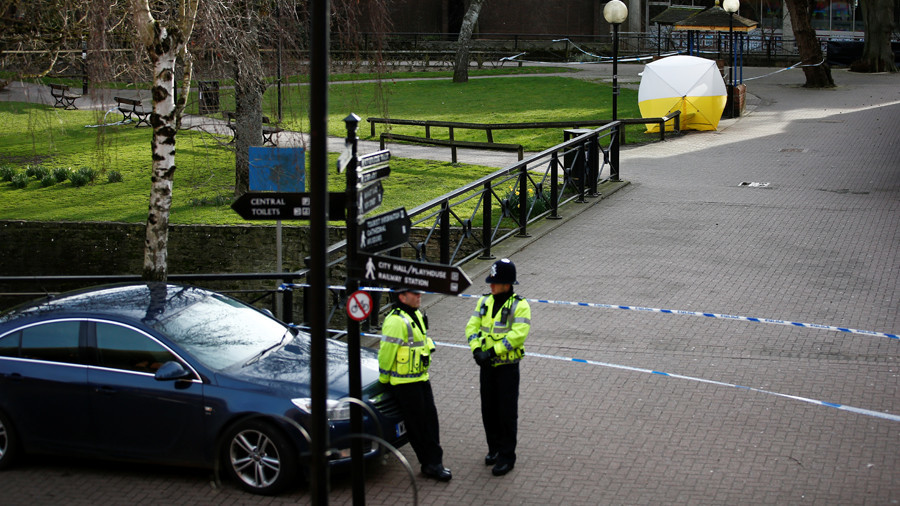Britain's baying mob rejects skepticism for emotion in heat of ex-spy poisoning crisis

RT,
15
March, 2018
One
of the striking things about the furor over the poisoning of ex-spy
Sergei Skripal and his daughter is the lack of skepticism in Britain
at the evidence presented, in what are still the very early stages of
the investigation.
It
may be a sign of the public mood, or at least the mood of the people
in power and the commentariat, that not only have they rushed to
judgment in mass groupthink, but they also turn viciously on anyone
attempting to express skepticism.
It
is of course understandable that the response to a nerve agent being
used to poison two people in a small provincial city is an emotional
one, but when the allegations being made are so serious, what is the
value of one MP after another standing up in Parliament to deliver
Churchillian declarations of defiance, before a suspect has even been
identified?
Labour
leader Jeremy Corbyn stood in Parliament and posed a series of
questions: “Has
the prime minister taken necessary steps under the Chemical Weapons
Convention to make a formal request for evidence from Russian
government under Article 9.2? Has high-resolution trace analysis been
run on a sample of the nerve agent that revealed any evidence as to
the location of its production or identity of its perpetrators?” He
went on: “And
while suspending high-level contacts, does the prime minister agree
it is essential to maintain a robust dialogue with Russia?”
Corbyn’s
request for further details on the evidence united the British
Parliament... against him. From the jeering Tories opposite, to his
own angry backbenchers, there was uncontained anger at his request to
clarify exactly what is currently known about events in Salisbury. If
the consensus is such that the leader of the opposition’s attempt
to propose some kind of opposing viewpoint is shouted down, shouldn’t
that cause at least some pause for thought? The British Parliament
has seen this kind of consensus before. The voices of dissent were
drowned out. It didn’t end well. And the evidence was wrong.
On
Thursday, writing in the Guardian, Corbyn warned against a
"McCarthyite
intolerance of dissent".
He warned Prime Minister Theresa May not to run ahead of the
evidence.
If
there was any doubt that cool heads are in short supply in British
politics currently, the defense secretary has told Russia to “go
away and shut up.”
That’s the diplomacy of a petulant teenager.
This suggests that
on Monday the British government didn’t know what had happened, but
because Russia didn’t use an arbitrary deadline to make an
admission of guilt, that was taken as evidence of culpability. There
was no material change in the publicly available facts, but there was
a public consensus, simply ‘Putin did it’.
Any
evidence of Russian guilt at this stage is circumstantial; the police
still have no definite suspect, but there is 100 percent conviction
in Britain that the Kremlin was to blame, no questions asked.
Britain’s
allies have been more guarded, generally falling in behind the Corbyn
view in suggesting more evidence is needed before conclusions are
made. Even the joint statement on Thursday from the UK, France,
Germany and the United States pointing the finger at Moscow couches
its accusations in uncertain terms. It says "Britain
believes"
it was “highly
likely Russia was responsible.”
That’s skepticism. It’s small, but it’s there.
Reuters
has even picked up a story showing that in the mid-90s, a similar
nerve agent was used to kill
a banker in Russia.
The person found guilty then was a scientist who had sold the
substance to supplement his wages. So, there are other possible
explanations that deserve at least a little time to be considered.
In
Britain though, politicians and the media have become a single mass
of expertise on Russia, all with deep insights into the workings of
the Kremlin.
There’s little doubt among them. Among the theories being expressed with such certainty are that Putin did this to boost his election campaign, or it’s a warning to other spies, or perhaps even it’s an attempt to destabilize Britain during a period of political turmoil. Of course there’s no real proof of any of this, and the vast majority of these Kremlin experts will be experts on Brexit next week, and last week they were experts on North Korea.
There’s little doubt among them. Among the theories being expressed with such certainty are that Putin did this to boost his election campaign, or it’s a warning to other spies, or perhaps even it’s an attempt to destabilize Britain during a period of political turmoil. Of course there’s no real proof of any of this, and the vast majority of these Kremlin experts will be experts on Brexit next week, and last week they were experts on North Korea.
When
two world powers are heading towards a serious diplomatic crisis, a
lack of skepticism is dangerous, and a baying mob driven by consensus
could have serious consequences. The
Times on
Thursday ran an opinion piece calling for Russia to be punished
through the targeting of Russian children in British schools.
That’s where the level of discourse currently stands.
That’s where the level of discourse currently stands.
No comments:
Post a Comment
Note: only a member of this blog may post a comment.